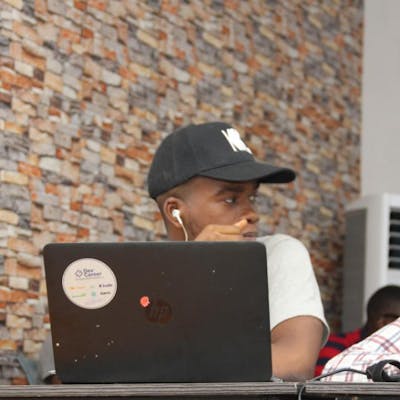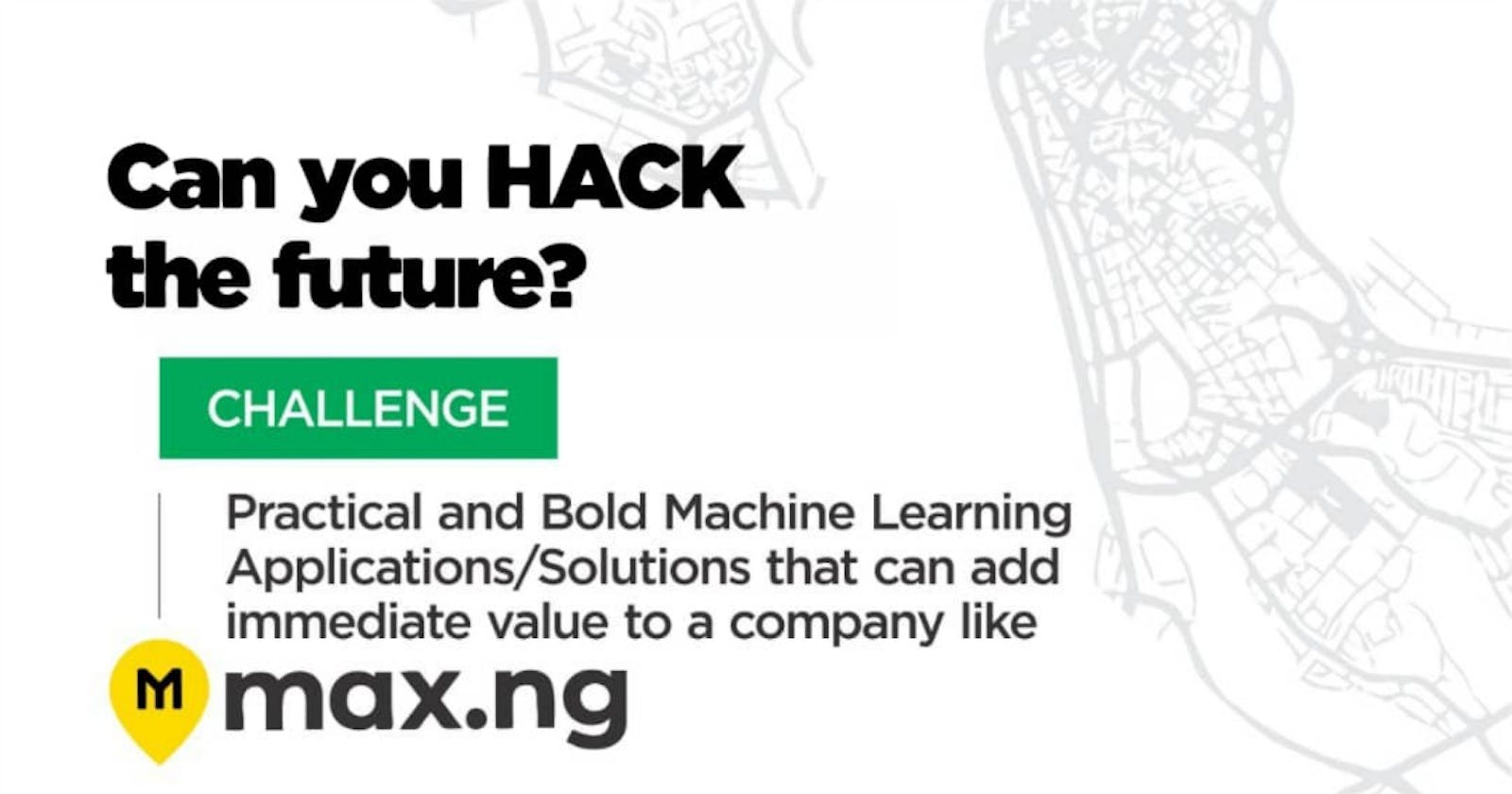'Can You HACK The Future' Ideathon: How We Made It to the Finals and Lost.
I recently read an article about why we should celebrate our failures. Just as we document our every success, we should also always document our failures. By documenting our failures, we speculate on them. We reflect on all the stuffs that went wrong and all we could have done better. Hence, we make better decisions when next we face similar hurdles.
What The Ideathon Entails.
'Can You Hack The Future' Ideathon is an hackathon - organized by Data Science Nigeria (DSN, for short), SeqHub Analytics and Max.ng (a bike-hailing and logistics company in Nigeria) -where participating teams discover problems facing the bike-hailing and logistics industry while also coming up with innovative and ground-breaking solutions to these problems.
To read more about the ideathon, click here .
It ran from December 23, 2019 till January 17, 2020. Selected teams got invited to the final pitch day which was held on January 25, 2020 at DSN Artificial Intelligence Hub, Yaba, Lagos.
How We Started.
As a participant at the 2019 edition of DSN Artificial Intelligence Bootcamp, I had the privilege of receiving firsthand information quite early on.
So I went about gathering my team. Of course, I got across to Folahan, my NaijaHacks teammate (he later opted out) and Kenny, a departmental friend who is also passionate about using Data to solve problems.
We brainstormed for days, and finally came up with a really nice idea of solving the issue of accessibility facing Max.ng.
To solve an accessibility problem, we need geospatial dataset. We finally stumbled upon the perfect organization to obtain our data from. And damn! It was a very perfect organization.
The organization is GRID3 Nigeria (Talk about solving local problems using local data, eh!) Read more about them here .
Sourcing the inch-perfect datasets took up a big chunk of our time. Folahan wasn't able to keep up with our progression because it was exam period in school and he wanted to focus on his final exams. So he opted out.
That was a big blow to us, because Folahan is extremely gifted, technically. That left me as the most technical guy and that was a pretty big shoe to fill. But we couldn't give up, can we?
We selected our datasets and started building away. We made use of kNN algorithm for our recommender systems. Having to research and learn how to explore geospatial datasets, it was a draining task for me and it affected my exam preparations greatly.
See, I have spent the past 4 weeks of my life working on this piece, plus I spent the last 4 days or so on working up our pitch while also doing repetitive practice on our presentations.
So right now, talking about what we did has become pretty monotonous for me. Coupled with the fact that we didn't rank among the winners, I think it's pretty understandable.
Everything you'd want to know about what we did and and how we did it, read the concept note and the pitch slides .
If you'd love to see the source code, click here.
Announcing the Finalists.
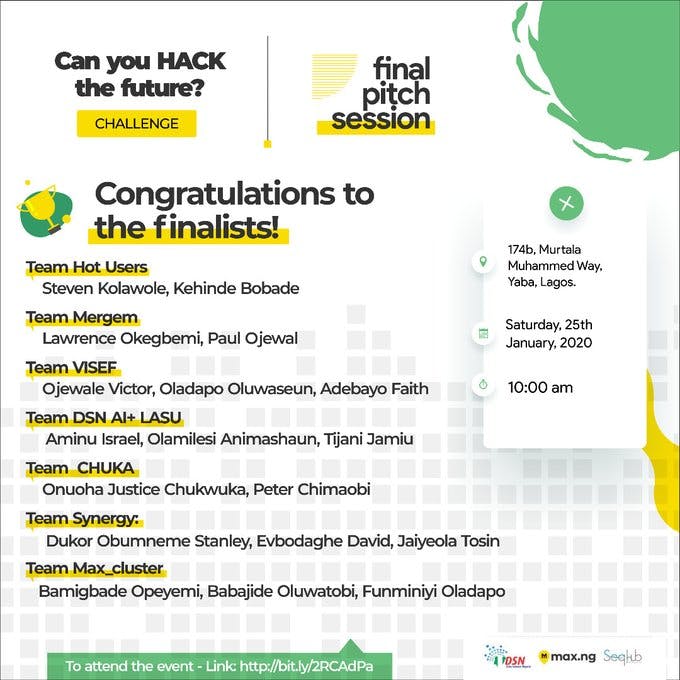
This happened on January 20, 3 days after we've submitted(we submitted at the brink of the deadline). Of course, we were overjoyed to be part of the finalists. But we were actually expecting it. Considering the sheer amount of research, careful steps and analysis that we put into our idea, there's no way we'd have miss out on the finals.
We were assigned a mentor, a man named Mr. Ezekiel, who we worked with throughout the days leading to the Pitch day. He is quite a great guy. I don't know what we'd have done without him. He provided us outstanding support before, during and after the Pitching sessions. At times, I got wondering on what made us warrant so much love and kindness from him. I couldn't come up with a reasonable reason. I really do hope he'll continue to mentor us, even after the Ideathon is done and dusted.
DSN also provided us with accommodation so we could arrive at Lagos a day prior to the competition. For this, we're very thankful.
The Pitch Day
Against our mentor's advice, we barely slept all night, working on our presentation slides. We rehearsed our pitch all morning before the event started.
We're the first team to present, and I think this was the biggest decision that went wrong for us.
We were bags of nerves. We were the youngest team at the finals. Universally, the first presentation is usually the presentation where the judges are at their hottest. And finally, every other team would learn from mistakes of the first team and also learn how the judges structure their questions.
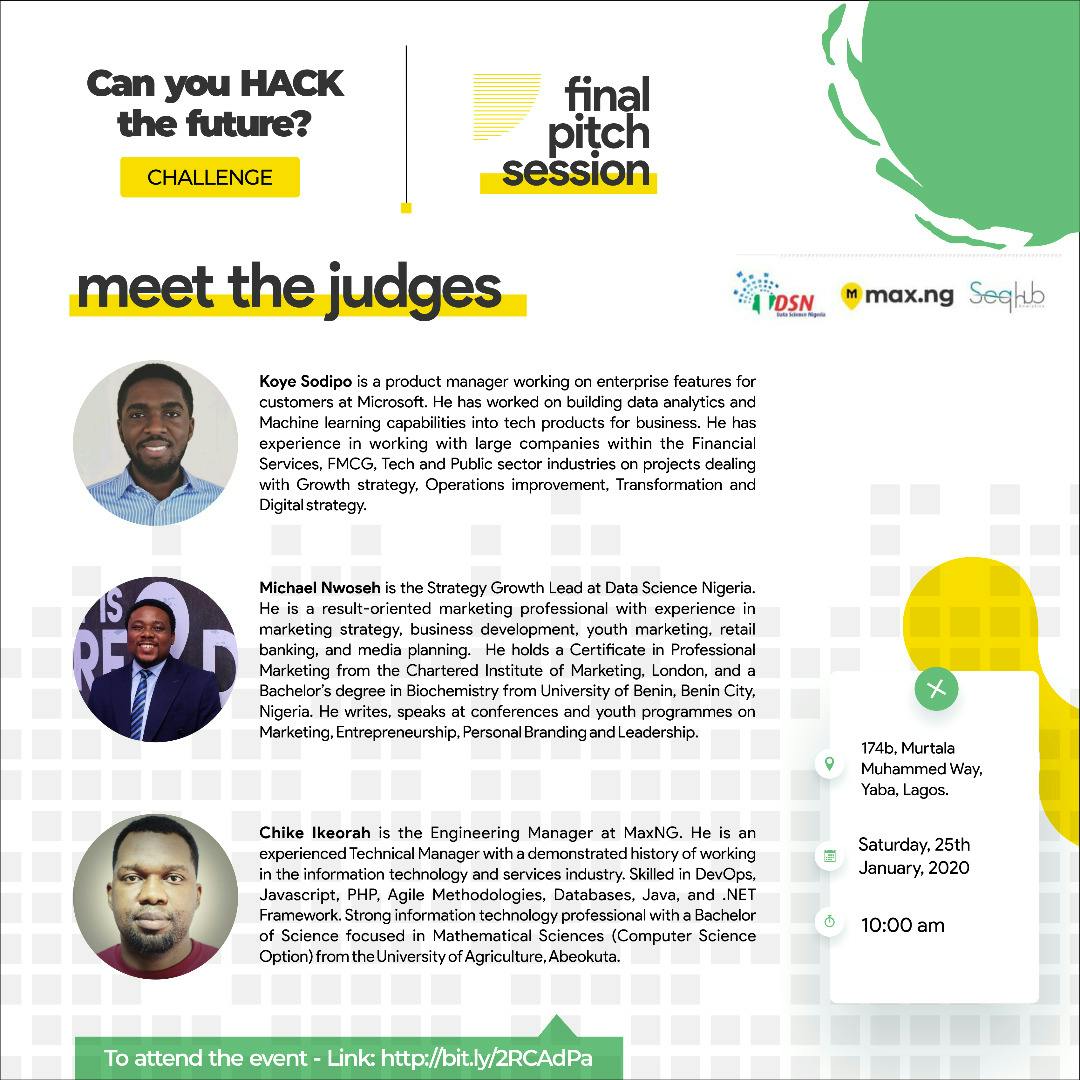
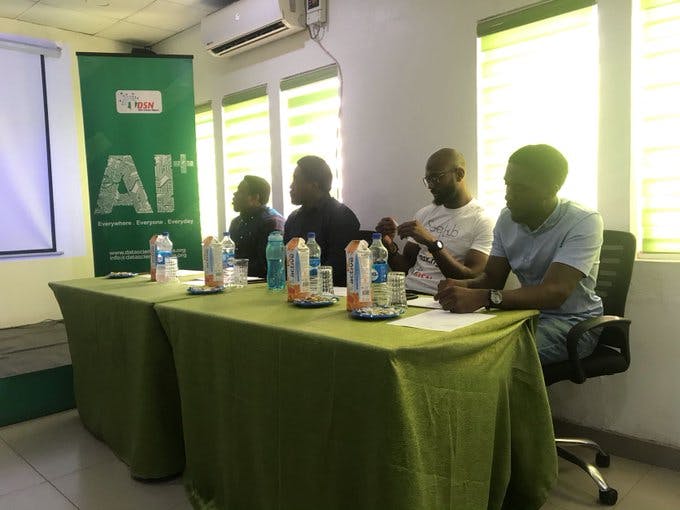
Nevertheless, we handled our presentation brilliantly. We handled the questions threw at us very well, too. But at the end of our presentation, I couldn't stem guinea pig feel. Kenny and our mentor kept reassuring me that we did brilliantly, but I wasn't quite convinced.
Other teams presented after us, and they were quite brilliant. I was impressed by the other 6 teams that presented after us. There is a reason why they (together with us) made it to the finals out of the 40 odd teams that made submissions. In the end, the top 3 were announced and we're not mentioned. You can imagine the disappointment. But then, the winners' ideas and solutions are quite exceptional, too.
What We Did Wrong…
- Our communication and presentation skills were subpar.
When people congratulated us personally on what a wonderful presentation we made, I did ask them about what we'd improve on. All of them mentioned that our communication skills upgrade could use an upgrade. Our Confidence level was low.
I said earlier, we are the youngest team. I'm half green (I've been pitching in hackathons before, but in the shadow of a senior man. This' the first time I was the senior man) Kenny was totally green. I think our greenness reflected in our voice tone, as we didn't command the stage well enough.
- We spent too much time expounding on our Problem Background.
We had 10 minutes for our presentation. We hadn't touched on our Solution yet when a cardboard was raised from the back telling us that we had only 2 minutes more. So we had to rush through our proposed solution.
Our key strengths were the logic behind our solution and the fact that we gathered our data locally (all the other teams made use of foreign-generated data, which are readily available on competition sites like Kaggle, Zindi, etc). Gathering our data locally means that we had to do tonnes of data cleaning, data analysis and feature engineering to make our data ready for model training.
But we didn't focus much on this advantage, because explaining the problem background took up the bulk of our time. We didn't expatiate well on the business value of our solution.
I thought once we've solved the issue of accessibility, the dough starts rolling in, right? Things don't really work out that well when you are discussing business propositions. You need to define how your idea translate to money explicitly. I will repeat the word 'explicitly' again for emphasis.
We were asked by a judge about the business value of our solution and I was just dumbfounded like "The value is right here under your nose!" I had to improvised and came up with stuffs but I don't think they're very convinced.
- Lastly, the coloring and extra spice matters.
Make your slides colorful! I can't repeat this enough. I felt that what they need most is our idea and solution so we didn't bother much with data and map visualization. How wrong I was!
I noticed the efforts that all the participating teams put into making their slides colorful. I'd to admit I was deeply impressed (especially by the 1st and 2nd position winners' graphics). Next time I forming a team for a hackathon, I'd definitely be adding a graphics designer to the team.
Finally…
It seems I was deeply disappointed. Yes, I was.
But by the time we were ready to make the trip back to Abeokuta, to our school, I was counting my blessings;
Our mentor, my wonderful teammate, the impressive folks I got to meet, the nice reviews that we got even though we didn't win, the internship opportunities (not the big one we wanted though), and very importantly, the experience.
Down below, from L-R, is my teammate, our mentor and I.
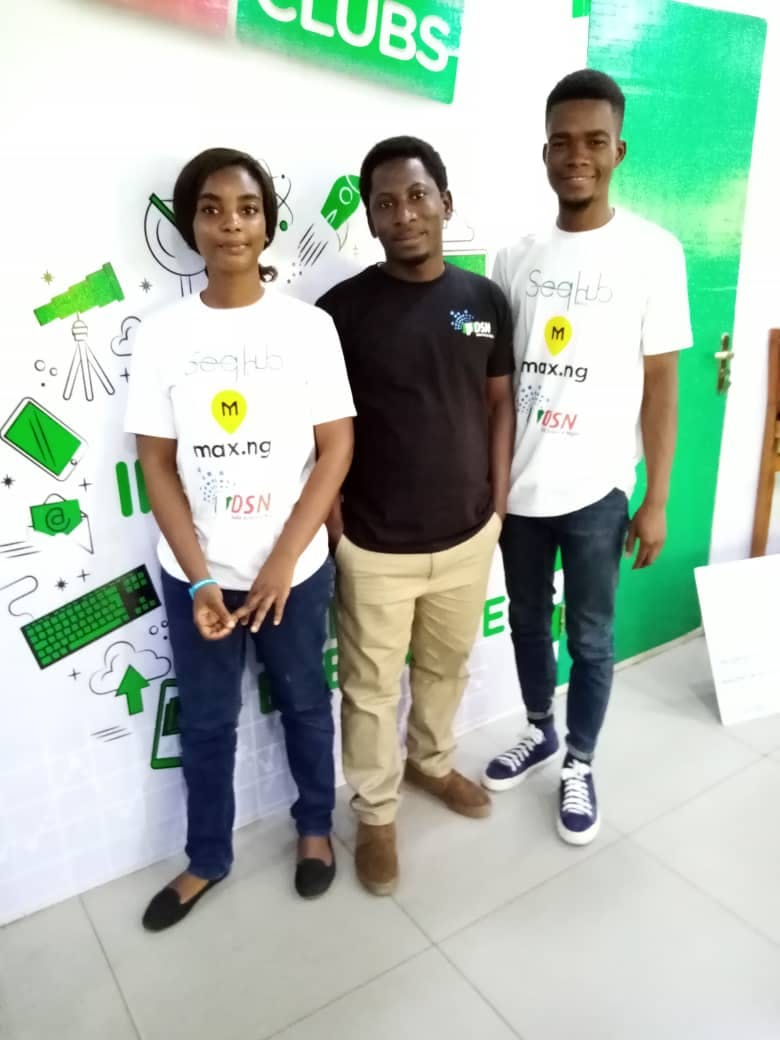
Thomas Edison didn't get the light bulb working on his first few tries, did he?
We move, guys. We'll get better. And we'll come back and smash challenges into smithereens.
Happy Hacking, folks. Let's go in pursuit of our dreams. And we don't ever give up on them, no matter how choppy the sea gets.
